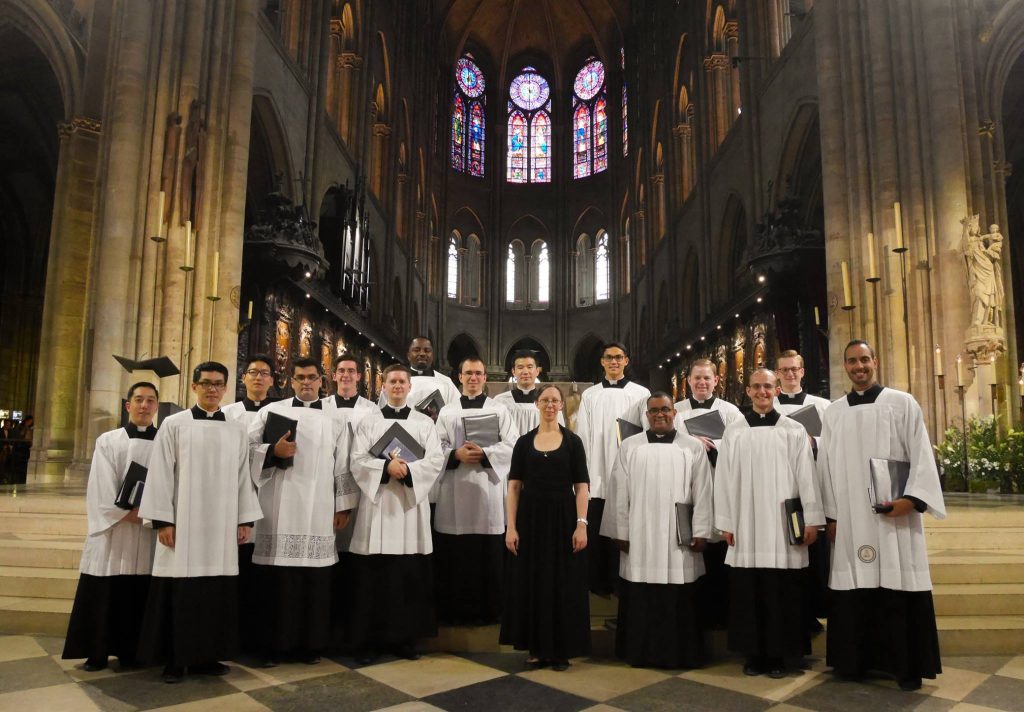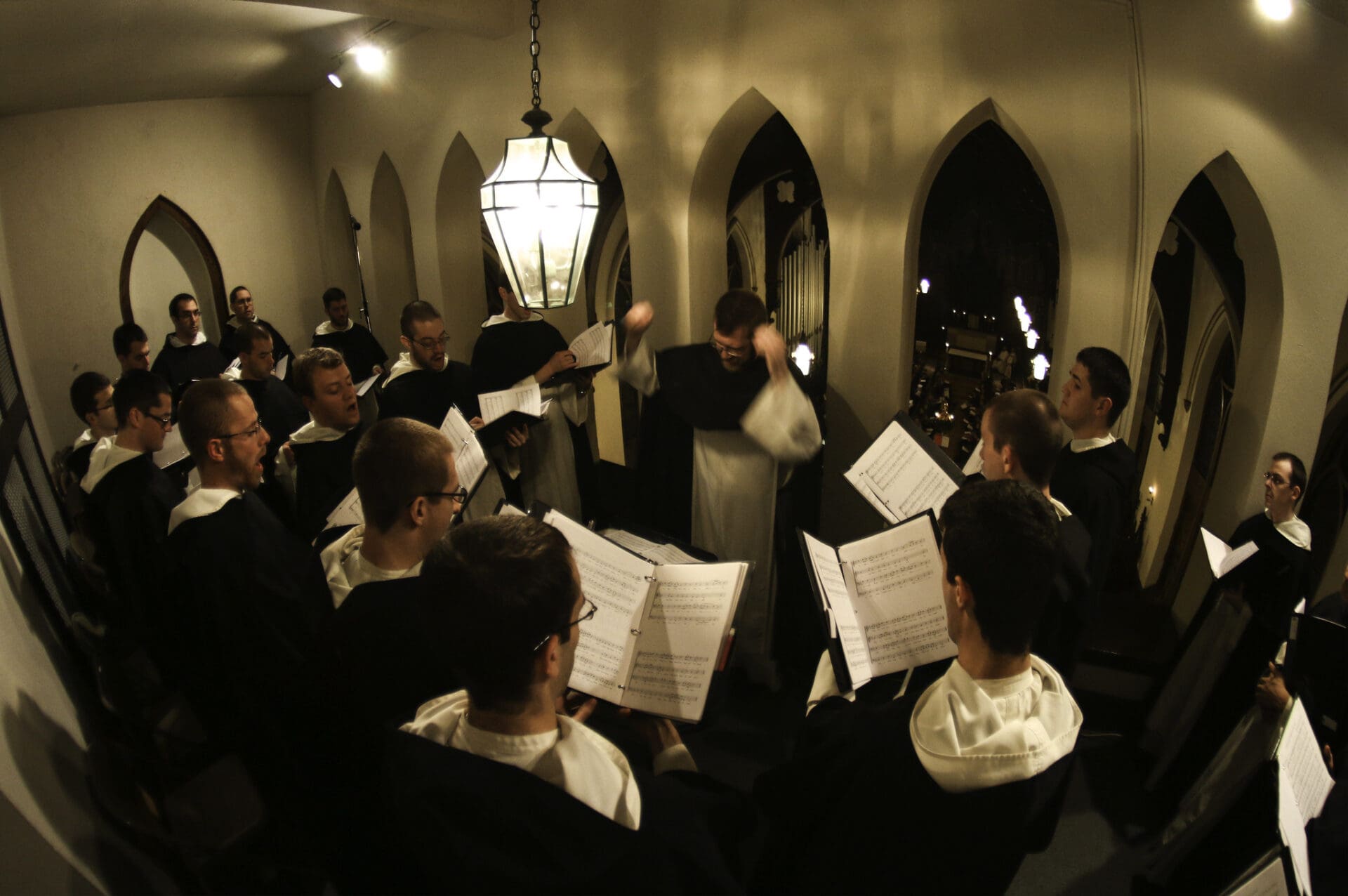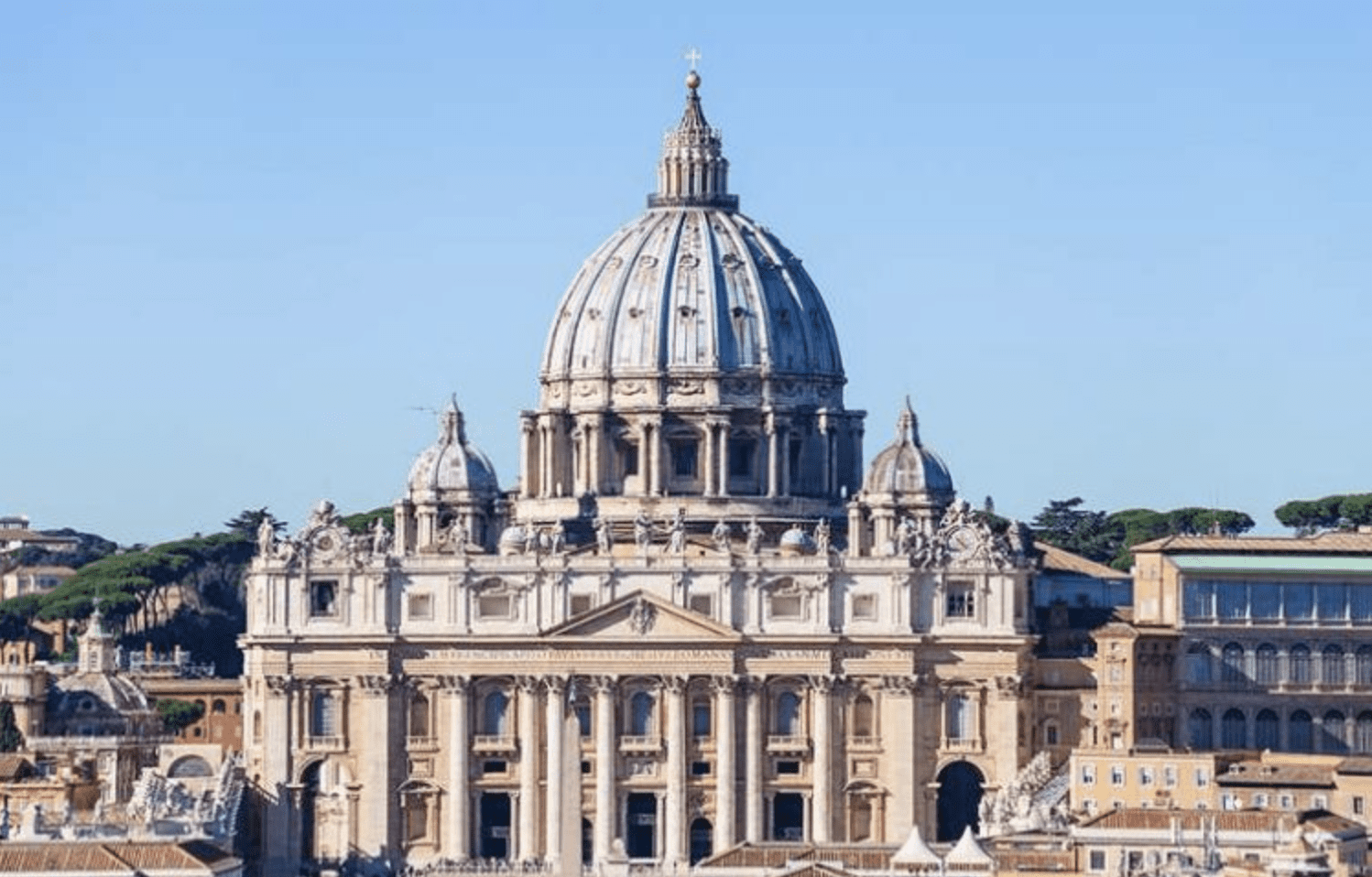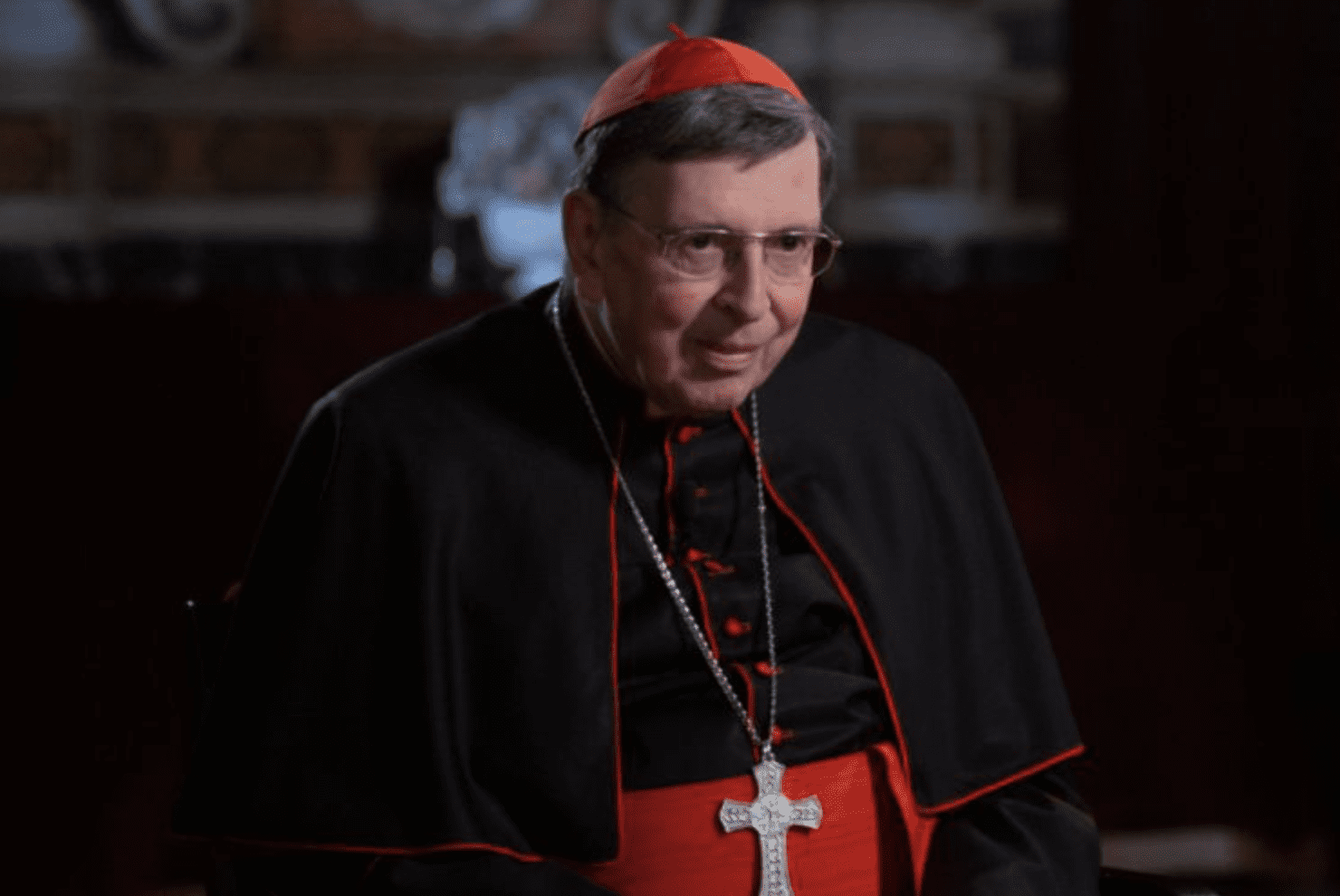For an integrated formation of the candidate, it is necessary to reflect on the identity of the priest.[1]
The 2016 Vatican document Ratio Fundamentalis, the impetus for the forthcoming 6th edition of the Program for Priestly Formation, makes clear that a theological reflection on the nature of the priesthood is the foundation upon which a seminary’s work is based. When we understand the identity of the priest, the nature of his configuration to Christ, the character of his spiritual fatherhood, the essence of his spousal love for Christ’s body, the Church, and what his role in the economy of salvation is, his “specific vocation to holiness”[2]—only then can we discern how such a man might be formed. The four areas, or pillars, of priestly formation—human, spiritual, intellectual, and pastoral—are properly grounded when their aim is clear.[3]
Such a theological consideration also sheds light on the role of music in priestly formation, especially when combined with a robust understanding of the metaphysical nature of beauty, the special character of music in God’s order of creation, the nature of the sacred liturgy, and the principles and treasury of the sacred music which serve an integral role in the sacred liturgy. As in worship, music is more than a simple add-on. To expect too little from music—especially sacred music—is to miss out on an abundance of grace in the life of the Church, both for priests and for the faithful. If instead we aim to think of music in the context of a holistic and effective formation program, in light of the nature of the priest, we arrive at goals and outcomes which are abundantly rich, bearing sweet and lasting fruits for the life of the Church.
To expect too little from music—especially sacred music—is to miss out on an abundance of grace in the life of the Church, both for priests and for the faithful.
What can music hope to accomplish in a program for priestly formation? Let’s look at its contributions to each of the four pillars of formation.
Human
The documents which govern priestly formation make clear that human formation is the foundation upon which other pillars of formation build. “The priest, who is called to be a ‘living image’ of Jesus Christ, head and shepherd of the Church, should seek to reflect in himself, as far as possible, the human perfection which shines forth in the incarnate Son of God and which is reflected with particular liveliness in his attitudes toward others as we see narrated in the Gospels…. In order that his ministry may be humanly as credible and acceptable as possible, it is important that the priest should mold his human personality in such a way that it becomes a bridge and not an obstacle for others in their meeting with Jesus Christ the Redeemer of humanity.”[4] How does music figure into this?
Throughout history, the Church has generally adopted the view of the Neo-Platonists concerning the role of music in the Christian life—that music naturally harmonizes with a person’s moral development. This view holds that training which helps the student grow in the ability to discern between better, more noble, and more beautiful music and that music which is less noble or lacking in beauty translates into a more acute ability to discern between what is good and bad in the moral life. This is because both judgments rely on the ability to accurately perceive reality as it is and compare it with standards. When compared with principles of moral theology and the holiness of Christ, is what I perceive good or bad? When compared with music I have heard that is both beautiful in how it is crafted and performed, is what I am hearing good or bad?

Education in the arts rests on teaching students to accurately perceive reality and to compare that reality with what ought to be. Is this note in tune? Is this brush stroke fitting for this line in the painting? Does the structure of this work possess cohesion and purpose? When one grows in the ability to observe reality precisely in the arts, it can translate into heightened sensitivity in the moral sphere. Is this action the right one to achieve the good goal? Does this habit aim the faculties of the soul towards Christ and virtue? Does this way of acting evidence a true love for God and neighbor?
To make these moral judgments with sensitivity and to help others discern how to do what is right and grow in holiness, the priest needs to be a keen observer of reality and human nature, being likewise able to compare what he observes with the person and actions of Christ. When what is beautiful and noble in the arts is perceived and preferred, what is good and noble in the moral life likewise becomes easier to discern and sweeter to do.
Beyond this, training in music contributes to human perfection. Certainly it is possible to get to heaven, love God, and be a priest without being good at music—thank God! But any human perfections we can work to acquire help us grow generally in our conformity to Christ. Growing in one’s musical ability and developing a discerning ear helps seminarians to grow in the ability to listen—a skill crucial for pastoral work. Music requires timeliness, singing or playing the right thing at the right time. Making music requires a sensitivity to others, hearing what is going on around oneself, and being mindful of the listener. The priest’s ability to discern the right thing to say or do at the right time is central in his spiritual fatherhood, and his ministry benefits from always taking into account how his words and actions are received.
Growing in one’s musical ability and developing a discerning ear helps seminarians to grow in the ability to listen—a skill crucial for pastoral work.
Performing music with excellence is demanding, requiring perseverance and discipline. And as anyone who has striven with God’s grace to acquire virtue and conquer sin knows, the development of good habits and dedication in one area makes it easier to develop virtue in other areas. Making music in community requires the ability to deal with and move on from one’s own mistakes and the mistakes of others. It requires good communication skills, both verbal and nonverbal. Learning music under the tutelage of a director helps the seminarian recognize, respond to, and benefit from the professional competencies of an expert. The development of these skills helps a priest persevere in difficulty and gives him the tools to effectively manage a parish, working effectively with those staff and volunteers that labor with him in parish life. Even something like having to smoothly move from one book to the right place in another book while singing in a schola develops the ability to think ahead in the liturgy so that one can execute the demands of the liturgy with excellence and in a prayerful manner.
With a strong human formation, grace can build upon nature in spiritual formation. What role is there for music in this?
Spiritual
Music has often been referred to as the most spiritual of the arts because, while it relies on the physical world of vibrations and human anatomy to be both executed and perceived, it’s heard—not seen. Music is invisible, which makes it especially effective at communicating in the physical world the realities of the spiritual, invisible world. A healthy formation in music likewise helps the seminarian more effectively realize the link between the physical and spiritual orders. What do things heard, seen, and done mean? What effect do the physical elements of the sacred liturgy and the sacraments have on the spiritual life of grace?
Music is the greatest conveyor of liturgical meaning, and no flock is without strong attachments to music. The seminarian must, therefore, prepare to place music in its proper place in the life of the parish.
When this link is made manifest in beautiful and fitting music, especially in the context of the sacred liturgy, a harmony appears between the physical and spiritual worlds that serves as a model for the whole of life. A seminarian who learns to pray through the words and tones that result from his physical exertion in singing learns that all he does and all he is, especially in the context of the sacred liturgy, has meaning and value and can be offered as a sacrifice to God for his sanctification and the sanctification of others. In this way, the practice of music becomes another tool in his life of grace, and it sparks his sacramental imagination to see the spiritual reality latent in everything.
Music also helps integrate the liturgy into a meaningful and beautiful whole, offering the opportunity to experience delight in prayer, sacraments, and worship. This delight becomes all the more crucial when the drudgery and discouragements that come with the challenges of priestly life feel all the more acute. A priest who learns to find refuge and solace in prayer and celebrating the Mass and the Divine Office is better enabled to persevere in his vocation.
There is also a connection between music and Sacred Scripture. Music helps activate the Word of God in the hearts and minds of both priests and faithful. Certainly, any text from the scripture or the liturgy when spoken carries with it the power to transform souls in the life of grace, but as Pope Pius X’s Tra le Sollecitudini reminds us, the clothing of beautiful music can “add greater efficacy to the text,”[5] allowing the seed of God’s word to find rich soil and take root. Music has power, through its beauty, to open even hardened hearts to the action of God’s grace. In the context of the sacred liturgy, beauty and text integrate in an excellent work of sacred music to act as a sacramental, opening our hearts to receive the abundant graces there present. When a seminarian learns to cherish this in his own experience of prayer and worship at the sacred liturgy, as a priest he can utilize this tool in effective and fruitful catechetical and evangelistic efforts amongst his flock.
Intellectual and Pastoral
And what of the contributions of music to the intellectual and pastoral formation of priests? A study of sacred music contributes to a rich understanding of Church history and the providence of God as expressed in the legitimate diversity of musical expressions throughout history. A seminarian’s careful examination of the documents that govern sacred music will enable him to effectively guide the music program in his future parish to align with what the Church envisions for her sacred liturgy. To be a good leader and father for his people, he has to be able to think with the mind of the Church on these matters.
Building a program of excellent musical formation for seminarians is possible only when priestly identity and the nature of music are understood in a profound way.
Even (maybe even especially) for those seminarians for whom music doesn’t hold a particular attachment, or who don’t possess any outstanding talents in music, it is important for them to understand music on the intellectual level so as to appreciate the profound role it will play in their pastoral ministry, regardless of their own personal attachments. Music is the greatest conveyor of liturgical meaning, and no flock is without strong attachments to music. The seminarian must, therefore, prepare to place music in its proper place in the life of the parish.
Priestly Tenor
What might a music program at a seminary looks like? At St. Joseph’s Seminary in Yonkers, NY, where I teach, it means that seminarians have some form of instruction in music nearly every semester. They receive four semesters of short voice lessons where they learn to match pitch, utilize correct vocal technique, and read music. In their first year, they learn to sing the entire Mass in English, and in the second year they learn to sing it in Spanish. In their second year they also take a course which covers the history of sacred music, sacred music legislation, and practical issues that arise in parish and school music programs. During the third and fourth years, seminarians focus on the more challenging chants of the Mass, especially prefaces, presidential prayers, and Gospels. In weekly house music rehearsals we improve our singing of Mass ordinaries, hymns, and chants of the Liturgy of the Hours. Students with a special aptitude for music serve as cantors and organists, and sing music from the Church’s treasury (especially Gregorian chant and sacred polyphony) in the schola cantorum. Certainly this is just one structure among many ways to realize a rich vision for seminary musical formation.
Building a program of excellent musical formation for seminarians is possible only when priestly identity and the nature of music are understood in a profound way. Also necessary is the support of bishops and the seminary administration. When both of these elements are present, it is possible to hope for a bright future of priests who know and love the Church’s music, and who are able to exercise it with excellence in their ministry.
Dr. Jennifer Donelson-Nowicka is an associate professor and the director of sacred music at St. Joseph’s Seminary (Dunwoodie) in NY. She serves on the boards of the Society for Catholic Liturgy and the Church Music Association of America, and is the managing editor of Sacred Music. Having given numerous workshops on Gregorian chant around the U.S. and Europe, she directs the Schola Cantorum of St. Joseph’s Seminary and the Metropolitan Catholic Chorale, and teaches Gregorian chant to children using the Ward method. Her weekly broadcast, “Square Notes: The Sacred Music Podcast,” is available on YouTube and podcast apps.
Adoremus Bulletin for May 2021: Vol. XXVI, no. 6
Notes
- Congregation for the Clergy, “The Gift of the Priestly Vocation: Ratio Fundamentalis Institutionis Sacerdotalis,” December 8, 2016. ↑
- John Paul II, Pastores Dabo Vobis, Post-Synodal Apostolic Exhortation, March 25, 1992, 19–23, here at 20. ↑
- Ibid., 43–59; USCCB, Program of Priestly Formation, 5th ed., 2006, 74–271. ↑
- Pastores Dabo Vobis, 43. ↑
- Pope Pius X, motu proprio, “Tra le Sollecitudini,” Nov. 22, 1903, 1. ↑


